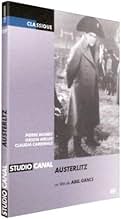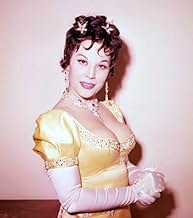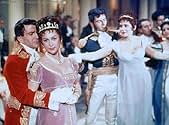AVALIAÇÃO DA IMDb
6,2/10
1 mil
SUA AVALIAÇÃO
Mais uma das aventuras de Napoleão nesta épica reconstrução da batalha de Austerlitz, onde teve a maior vitória de sua carreira, sobre os russos.Mais uma das aventuras de Napoleão nesta épica reconstrução da batalha de Austerlitz, onde teve a maior vitória de sua carreira, sobre os russos.Mais uma das aventuras de Napoleão nesta épica reconstrução da batalha de Austerlitz, onde teve a maior vitória de sua carreira, sobre os russos.
- Prêmios
- 1 indicação no total
- Direção
- Roteiristas
- Elenco e equipe completos
- Produção, bilheteria e muito mais no IMDbPro
Enredo
Você sabia?
- CuriosidadesIn the 1920s Abel Gance had written a six-part movie biography of Napoleon. He shot the first part (Napoleão (1927)), which turned out to be a financial disaster. He sold the sixth part to Lupu Pick, who shot Napoleon auf St. Helena (1929). Wanting to make a comeback at the end of the 1950s, Gance rewrote the third part to make it "Austerlitz".
- Erros de gravaçãoIn the scene in William Pitt's office in London which is set in the early 1800's, you can see in the background through the window the Houses of Parliament and Big Ben, 60 years before they were built.
- Versões alternativasThe original French version runs longer than the English dubbed international one. It contains extra scenes including ones with Napoleon visiting his mistress and of Ségur (Jean-Louis Trintignant) imagining the coronation of the emperor for the palace staff.
- ConexõesEdited into Histoire(s) du cinéma: Seul le cinéma (1994)
Avaliação em destaque
I was under the impression for ages that Abel Gance only made one Napoleon film (all the way back in 1927), and that he wanted to make five or six, but never got the chance. It turns out this isn't entirely true. Not only is Napoleon (1927) long enough to be two or three films in one (it's like 5.5 hours long), but Gance got to make a sort-of sequel in 1960, with the also epic-length The Battle of Austerlitz.
This 1960 film is about half the length of Napoleon, but that still puts it at approximately 170 minutes. It also feels like two movies in one, with a lot of political drama being the focus of the first half, and then the second half centering on planning for the titular battle alongside showing some of it.
I thought the second half would be a good deal more engaging, but I think The Battle of Austerlitz starts quite well, staying pretty engaging for maybe the first half of its first half. Things don't necessarily pick up in a big way once the second half starts, though. It's a bit plodding in different ways to the first half, and it becomes apparent at a point that even the battle parts aren't really going to be about depicting exciting battles. If you come in hoping for something similar to the 1966/67 War and Peace or Waterloo, you'll probably come away disappointed.
The methodical approach to it all (across both halves), while dry, is somewhat admirable. Abel Gance isn't doing nearly as many adventurous things with the camera this time around, which can be disappointing after having watched his 1927 film, but I guess there's sound now, and it's a new approach. The transition from making a silent Napoleon film to making a more traditional one with dialogue was more seamless than I'd been anticipating, and Gance would've had to have been fairly old while making this. I think he did a decent job, all things considered.
Still, this is probably just a curiosity piece for those who were intrigued by and liked Napoleon, or just anyone who's interested in any film about Napoleon Bonaparte. There sure are many of them; I keep coming across new ones all the time, and honestly, I don't think I've seen any I could call flat-out bad yet.
This 1960 film is about half the length of Napoleon, but that still puts it at approximately 170 minutes. It also feels like two movies in one, with a lot of political drama being the focus of the first half, and then the second half centering on planning for the titular battle alongside showing some of it.
I thought the second half would be a good deal more engaging, but I think The Battle of Austerlitz starts quite well, staying pretty engaging for maybe the first half of its first half. Things don't necessarily pick up in a big way once the second half starts, though. It's a bit plodding in different ways to the first half, and it becomes apparent at a point that even the battle parts aren't really going to be about depicting exciting battles. If you come in hoping for something similar to the 1966/67 War and Peace or Waterloo, you'll probably come away disappointed.
The methodical approach to it all (across both halves), while dry, is somewhat admirable. Abel Gance isn't doing nearly as many adventurous things with the camera this time around, which can be disappointing after having watched his 1927 film, but I guess there's sound now, and it's a new approach. The transition from making a silent Napoleon film to making a more traditional one with dialogue was more seamless than I'd been anticipating, and Gance would've had to have been fairly old while making this. I think he did a decent job, all things considered.
Still, this is probably just a curiosity piece for those who were intrigued by and liked Napoleon, or just anyone who's interested in any film about Napoleon Bonaparte. There sure are many of them; I keep coming across new ones all the time, and honestly, I don't think I've seen any I could call flat-out bad yet.
- Jeremy_Urquhart
- 11 de set. de 2024
- Link permanente
Principais escolhas
Faça login para avaliar e ver a lista de recomendações personalizadas
- How long is The Battle of Austerlitz?Fornecido pela Alexa
Detalhes
- Data de lançamento
- Países de origem
- Idioma
- Também conhecido como
- A Batalha de Austerlitz
- Locações de filme
- Empresas de produção
- Consulte mais créditos da empresa na IMDbPro
Bilheteria
- Orçamento
- US$ 4.000.000 (estimativa)
- Tempo de duração2 horas 46 minutos
- Mixagem de som
- Proporção
- 2.35 : 1
Contribua para esta página
Sugerir uma alteração ou adicionar conteúdo ausente

Principal brecha
What is the English language plot outline for Com Sangue se Escreve a História (1960)?
Responda





































